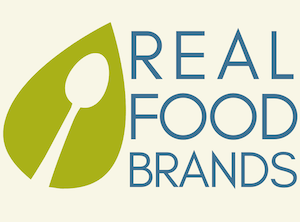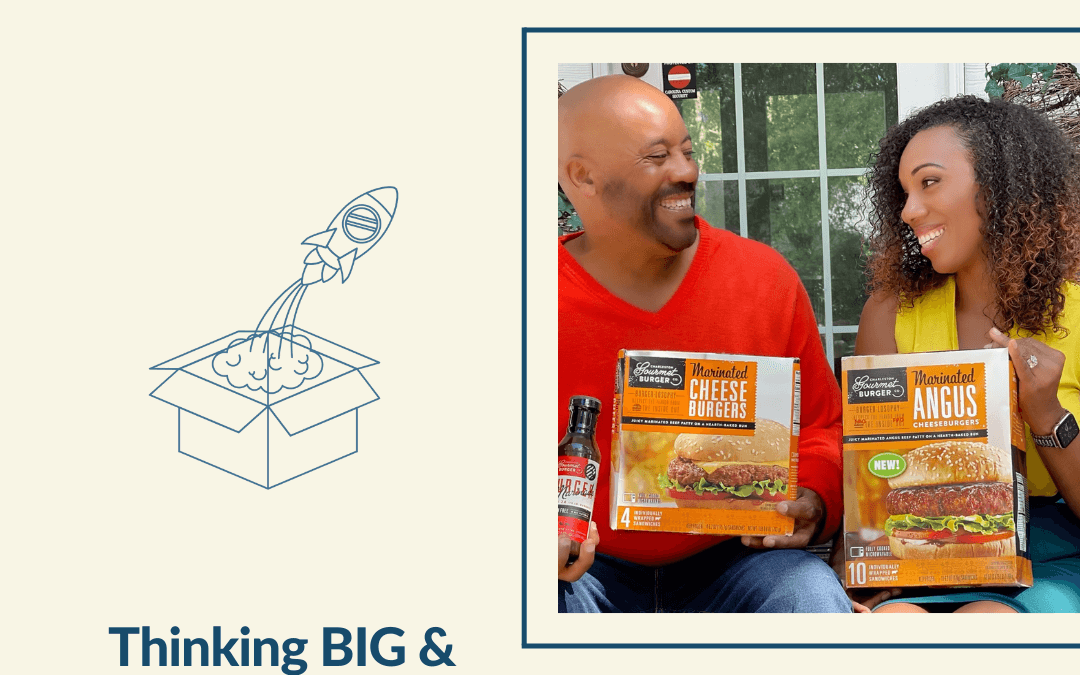Sometimes you need to let yourself dream and think big. Instead of letting other people tell you how things work and why you can’t do something, it can pay off to look at things from a new perspective. It helps, of course, to have a great story, which is something that brand strategy work can really help with.
Today on Episode 109 of the Real Food Brands Marketing Podcast, Host and Food Brand Strategist Katie Mleziva sits down with Monique and Chevalo Wilsondebriano, owners of Recipe for Retail and the Charleston Gourmet Burger Company. We’ll learn how thinking BIG took them from a backyard BBQ…to a food business idea…to a product…to a brand that’s on the shelves of Whole Foods, World Market, Costco, Wal-Mart, and more…to winning QVC’s Choice Food Award.
From Family Cookout to Big Box Shelves
“We first tested our backyard burger at a family cookout at our home and the response our family and friends gave to us let us know we were onto something,” Chavalo says. They decided to take their idea to the Charleston Farmer’s Market, but first, they would have to audition. The judges went down the line taking a single bite of food at each participant’s booth and then throwing the rest away. When the lead judge got to their booth and ate the entire burger they really knew they had something.
Monique and Chevalo thought of the farmer’s market as a lab where they could test their product across all sorts of demographics. “We have a go big or go home attitude,” Monique says, “we sat down and wrote a plan for where we would want to sell our products: we had Walmart, we had Costco, we had all big box stores on there and that became the goal.”
Why Telling Your Story Is So Important
This ambition lead them to do some bold things, like just walking into a Whole Foods and pitching their product: “We didn’t know that there was a whole entire process, we just walked in and started talking,” Monique says, “I didn’t even have the product produced yet.” From there, they pitched more and more grocery stores and used their farmer’s market earnings to fund a first production run to send them for samples, “that’s how we were able to get on the shelf so quickly” she says.
While that’s not necessarily “by the book,” it worked because they were so compelling at making their pitch. A similar thing happened with press coverage. They had been paying a publicist to pitch different media outlets and weren’t seeing any results, but then they finally got connected with the Food Network directly. “The people wanted to hear from us—they didn’t want to hear from someone representing us,” Chevalo says. He went on to share that the publicist did help them see the value of being the faces of their brand though, and that advice made a huge difference in terms of the brand’s personality and the way people connect with Monique and Chevalo as the people behind it all.
As Katie says, “while sometimes we need to have different team members do things on our behalf, there really is no substitute for hearing that passion come through in your voice. It makes people get excited and want to be a part of what you’re doing.”
Monique and Chevalo’s Recipe for Retail Course
With all of their success, Monique and Chevalo started to get questions from people with their own stories and ideas and passions. How were they able to get their product on retail shelves? They were also hearing from buyers about all the times someone had a great product but didn’t do something simple like insurance or barcodes, but they didn’t have the time to tell them why they were saying no.
To help bridge the gap between food entrepreneurs and retail buyers, Monique and Chevalo created the Recipe for Retail course. It’s a step-by-step plan to develop a product, create a brand, and get it on retail shelves. They prepare you for everything so when you’re sitting in that pitch meeting you have everything you need to succeed.
If you’re thinking through how to apply these tips to your small but mighty food business or farm, please don’t hesitate to reach out and get in touch with Katie here.
Now, let’s go shake up shopping carts!
Quotes:
“We have a go big or go home attitude—we sat down and wrote a plan for where we would want to sell our products: we had Walmart, we had Costco, we had all big box stores on there and that became the goal.” – Monique Wilsondebriano
While sometimes we need to have different team members do things on our behalf, there really is no substitute for hearing that passion come through in your voice. It makes people get excited and want to be a part of what you’re doing.” – Katie Mleziva
“When they were going in the store to buy our product, they were actually going in because they saw themselves in us.” – Monique Wilsondebriano
“When you go on the shelf and you see a Charleston Gourmet Burger product, it’s not just a bottle and a marinade—it’s part of us, you understand the history of how much we love burgers and how we got to this point.” – Chevalo Wilsondebriano
In This Episode:
- How Monique and Chevalo started their business at a backyard barbeque.
- How they used the Charleston Farmer’s Market as a testing ground for their product.
- Why their personal story worked so well to get them on retail shelves quickly.
- Why working on their brand early and getting it right was so important to their success.
- What people are really buying when they’re buying your product.
- How they help other entrepreneurs with their Recipe for Retail course.
Resources:


